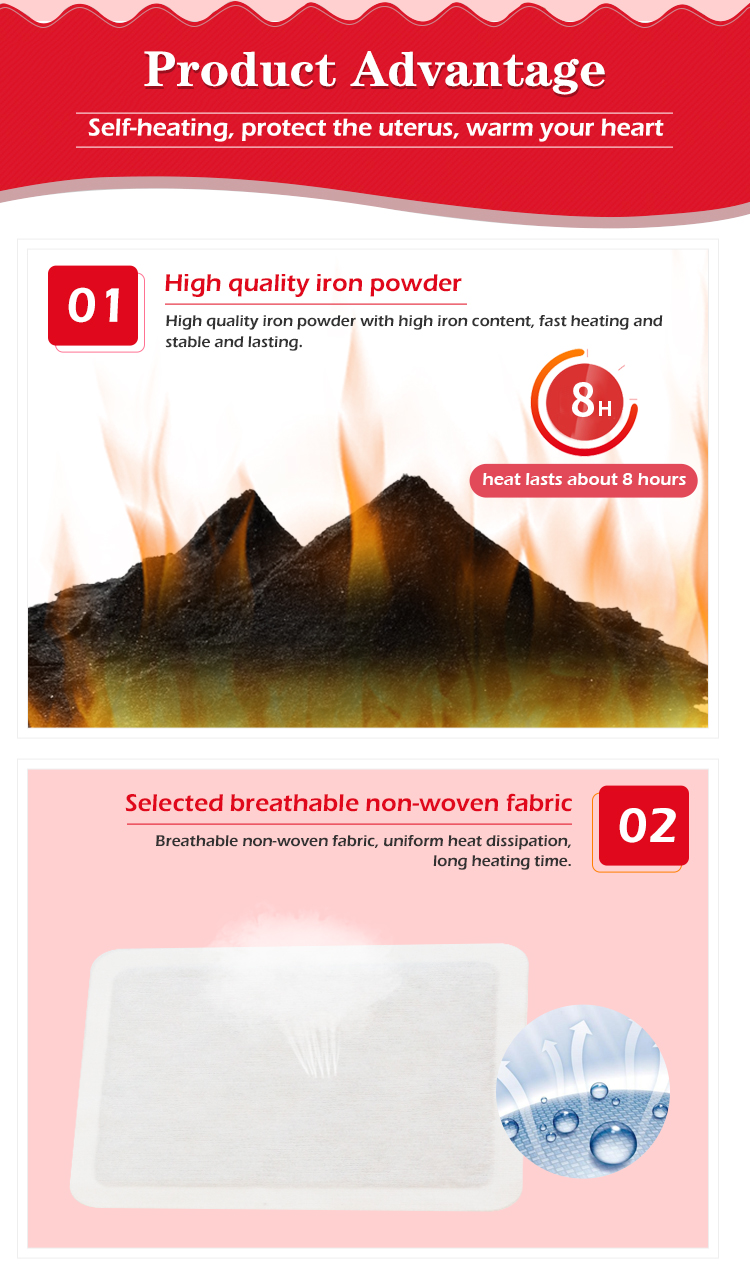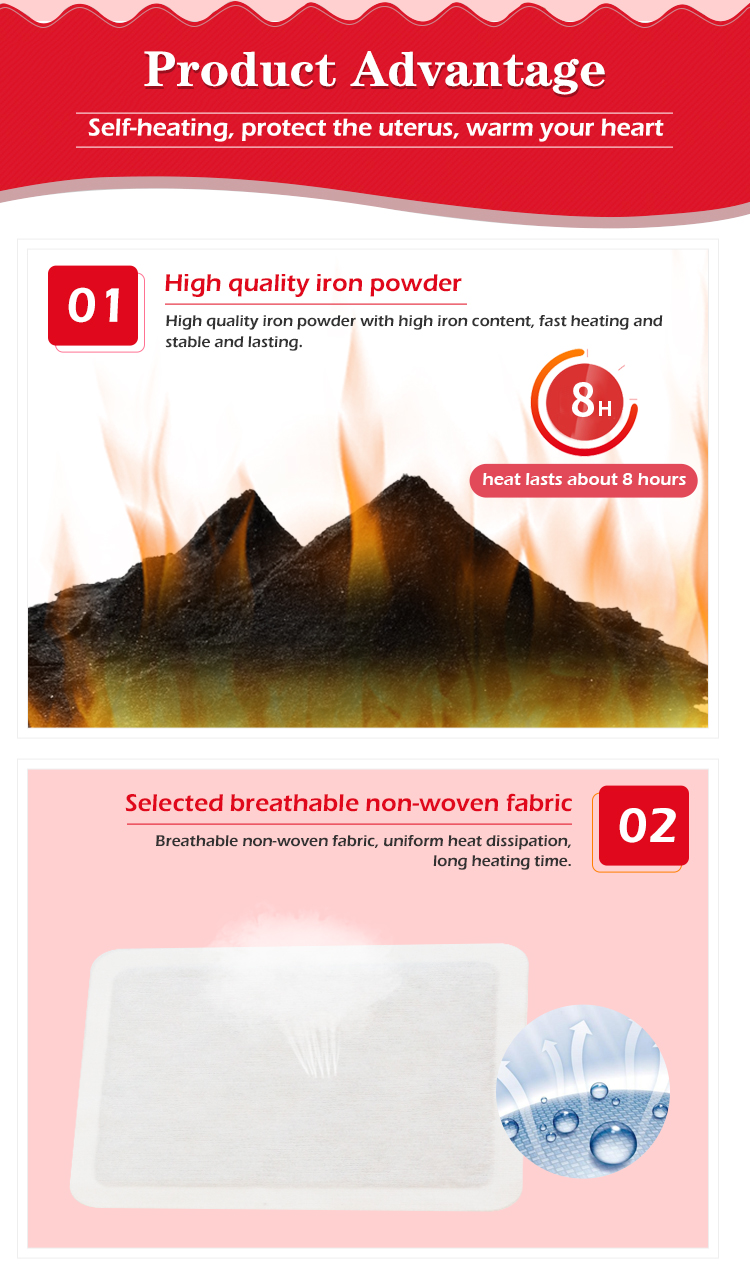Exploring the Environmental Protection and Sustainable Development Strategies of Deep Heat Patches OEM
As global demand for environmentally friendly products grows, Deep Heat Patches OEM companies are increasingly focused on implementing sustainable manufacturing practices. This shift is crucial not only for protecting the planet but also for meeting the expectations of environmentally-conscious consumers and health-focused brands. Deep Heat Patches Manufacturers are now integrating green technologies, reducing waste, and using eco-friendly materials to improve the sustainability of their products. This article will explore various sustainability strategies adopted by Deep Heat Patches OEMs, including innovations in eco-friendly packaging, sustainable materials, and energy-efficient manufacturing. It will also examine how these practices benefit brands that partner with sustainable Deep Heat Patches Suppliers and how they can help companies stand out in a competitive market.

1. Why Sustainability Matters in the Deep Heat Patch Industry
Meeting Consumer and Regulatory Demands
Today’s consumers are increasingly aware of environmental issues, and many prioritize eco-friendly products. For brands, partnering with a Deep Heat Patches OEM that uses sustainable practices helps align their products with these values, enhancing brand loyalty. Moreover, environmental regulations are becoming stricter worldwide, with many countries mandating more responsible manufacturing practices. By collaborating with a Deep Heat Patches Manufacturer that meets these requirements, brands can avoid potential regulatory hurdles.
Enhancing Brand Image
Environmental sustainability isn’t just about regulatory compliance—it also builds a strong, positive brand image. Many brands are finding that offering Private Label Deep Heat Patches made with eco-friendly materials boosts their appeal to health-conscious and environmentally aware consumers. A commitment to sustainability, backed by a reputable Deep Heat Patches Supplier, can become a powerful differentiator in the marketplace.
2. Sustainable Materials in Deep Heat Patches
Eco-Friendly Ingredients
One of the first steps in creating sustainable Custom Deep Heat Patches is using eco-friendly and renewable ingredients. Many Deep Heat Patches Manufacturers are now incorporating natural ingredients, such as menthol or capsaicin derived from plants, to minimize reliance on synthetic chemicals. These natural ingredients are biodegradable and generally less harmful to the environment, making them a popular choice for both brands and consumers seeking environmentally responsible solutions.
Biodegradable Adhesives and Linings
Traditional adhesives and linings can contain synthetic materials that aren’t easily biodegradable. In response, some Deep Heat Patches OEM companies have begun using biodegradable adhesives that can break down more naturally over time, reducing their environmental impact. Choosing a Deep Heat Patches Supplier that offers biodegradable options allows brands to incorporate these sustainable elements into their private label products.
3. Sustainable Packaging Solutions
Reducing Single-Use Plastics
Packaging waste is one of the largest contributors to environmental pollution, and single-use plastics are particularly harmful. Deep Heat Patches Manufacturers are actively working to reduce their plastic use by introducing recyclable and compostable alternatives. Options like paper-based or recyclable plastic packaging minimize waste and meet the needs of eco-conscious consumers.
Innovations in Recyclable and Compostable Materials
Many Deep Heat Patches OEMs are also exploring recyclable and compostable materials for individual patch packaging, such as recyclable aluminum foil or biodegradable plastics. By selecting an OEM that uses these sustainable packaging options, brands can enhance their environmental credentials and appeal to consumers looking to reduce their carbon footprint.
Minimalist Packaging Design
A growing number of Custom Deep Heat Patches brands are adopting minimalist packaging, which reduces both material usage and shipping weight. By cutting down on unnecessary packaging materials, brands can decrease their overall environmental impact. Choosing a Deep Heat Patches Manufacturer with minimalist design capabilities aligns with sustainable development goals while creating a modern, clean product aesthetic.
4. Energy-Efficient Manufacturing Practices
Reducing Energy Consumption
Energy consumption is a major factor in the environmental impact of any manufacturing process. Many Deep Heat Patches OEM companies are now investing in energy-efficient machinery and renewable energy sources. Solar power, for example, is becoming an increasingly popular choice for powering production facilities. By partnering with a Deep Heat Patches Supplier that prioritizes energy-efficient production, brands can ensure that their products are produced with minimal energy waste.
Water Conservation Measures
Manufacturing often requires substantial water use, which can lead to significant waste. Sustainable Deep Heat Patches Manufacturers employ water-saving technologies, such as closed-loop water systems, to conserve this valuable resource. By recycling water within the manufacturing process, these OEMs not only save water but also reduce pollution, as less contaminated water is released into the environment.
5. Waste Reduction Strategies
Recycling and Reusing Materials
A top priority for Deep Heat Patches OEM companies focused on sustainability is waste reduction. Many manufacturers implement recycling programs within their production lines to reuse materials like paper, plastic, and metal. These programs reduce waste sent to landfills and decrease the need for new raw materials.
Sustainable Disposal of Manufacturing Byproducts
Manufacturing byproducts can be harmful if disposed of improperly. An eco-conscious Deep Heat Patches Supplier will ensure that byproducts are handled responsibly, such as by working with waste management companies to recycle, treat, or safely dispose of waste. Brands can be confident that partnering with these OEMs means that their products are produced with minimal environmental harm.
6. Certifications and Standards for Eco-Friendly Deep Heat Patches
Recognized Certifications
Eco-friendly certifications are essential for establishing credibility in sustainable manufacturing. Many Deep Heat Patches Manufacturers pursue certifications such as ISO 14001 (Environmental Management) or ENERGY STAR to validate their sustainable practices. For brands, selecting an OEM with these certifications is a clear indicator of environmental responsibility.
Product-Specific Certifications
For brands looking to create Custom Deep Heat Patches with the highest sustainability standards, specific certifications like USDA Organic or ECOCERT (for organic and natural cosmetics) may be relevant. These certifications can enhance the product’s marketability and provide an additional selling point for eco-conscious consumers.
7. How Sustainable Deep Heat Patches OEM Practices Benefit Brands
Building Consumer Trust and Loyalty
When consumers recognize a brand’s commitment to sustainability, they’re more likely to remain loyal. By partnering with a Deep Heat Patches OEM that prioritizes eco-friendly practices, brands can build a reputation for environmental responsibility. This loyalty translates to increased customer retention and positive word-of-mouth, enhancing the brand’s long-term profitability.
Competitive Advantage in a Growing Market
Eco-friendly products are gaining market share across industries, and personal care is no exception. Offering Private Label Deep Heat Patches that are sustainably produced sets brands apart from competitors. As more consumers prioritize sustainable purchases, brands with a green focus will find themselves in an advantageous market position.
8. Key Considerations When Choosing a Sustainable Deep Heat Patches Supplier
Evaluating Environmental Policies
When selecting a Deep Heat Patches Supplier, brands should carefully review the supplier’s environmental policies. Key factors to look for include commitments to reduce waste, minimize emissions, and implement energy-efficient practices.
Prioritizing Transparent Manufacturing Practices
Transparency is essential for brands that want to communicate their environmental responsibility to consumers. Working with a Deep Heat Patches Manufacturer that openly shares information about its sustainable practices ensures that brands can confidently promote their products’ eco-friendly qualities.
Related Questions and Answers
How can Deep Heat Patches OEM contribute to environmental protection?
By implementing eco-friendly manufacturing practices, such as using sustainable materials, reducing energy consumption, and minimizing waste, Deep Heat Patches OEMs contribute to environmental preservation.What sustainable materials are used in Custom Deep Heat Patches?
Many Deep Heat Patches Manufacturers use biodegradable adhesives, natural ingredients like menthol, and recyclable or compostable packaging materials.Why is eco-friendly packaging important for Private Label Deep Heat Patches?
Eco-friendly packaging reduces waste and environmental impact, aligning with consumer demand for sustainable products and enhancing brand reputation.What certifications should I look for in a sustainable Deep Heat Patches Supplier?
Certifications like ISO 14001 (Environmental Management), ENERGY STAR, and product-specific certifications (e.g., USDA Organic) indicate a supplier’s commitment to sustainability.How does energy-efficient manufacturing benefit brands?
Energy-efficient practices lower production costs and reduce environmental impact, allowing brands to offer sustainably produced products that appeal to eco-conscious consumers.
By choosing to work with a Deep Heat Patches OEM that values sustainability, brands can offer products that support environmental goals while meeting growing consumer demand for green solutions. Sustainable manufacturing practices not only contribute to the preservation of the planet but also provide brands with a meaningful competitive edge in today’s market.






